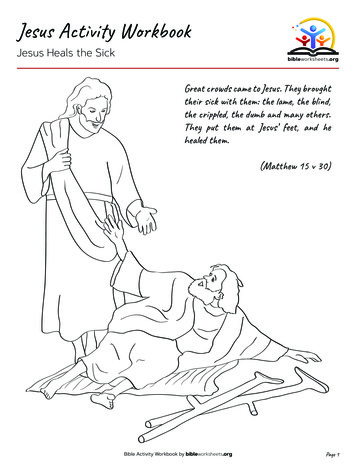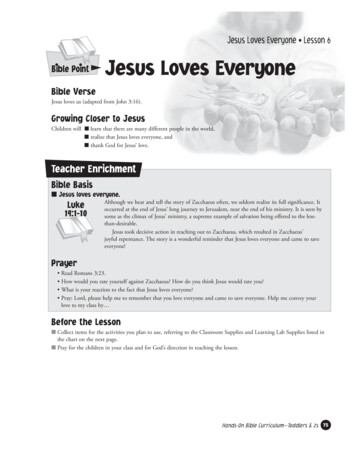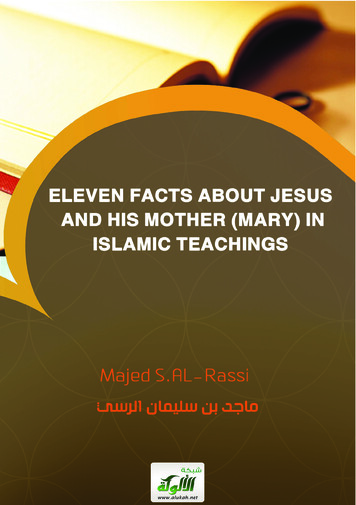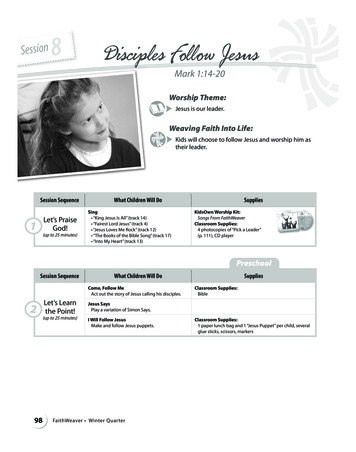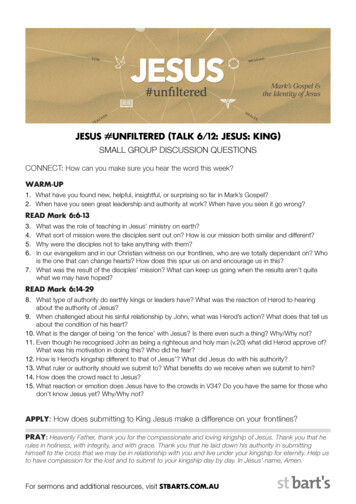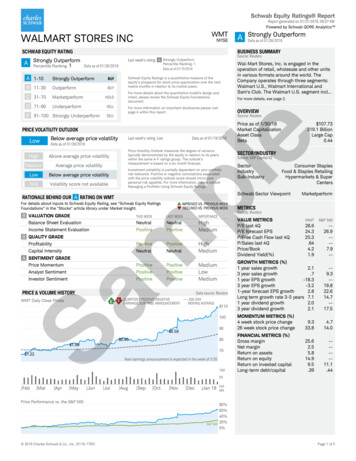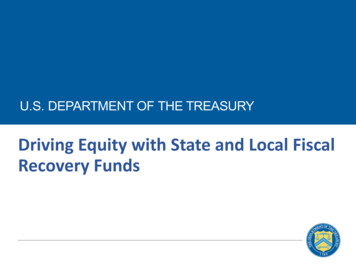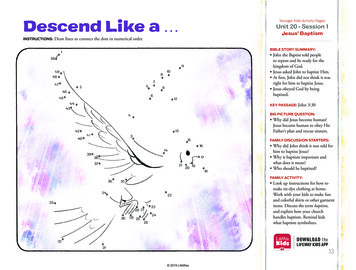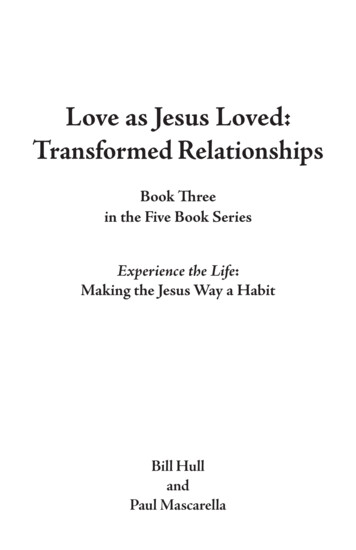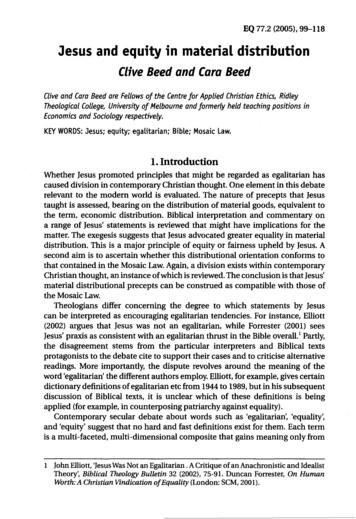
Transcription
EQ 77.2 (2005), 99--118Jesus and equity in material distributionClive Seed and Cara SeedClive and Cara Beed are Fellows of the Centre for Applied Christian Ethics, RidleyTheological College, University of Melbourne and formerly held teaching positions inEconomics and Sodology respectively.KEY WORDS: Jesus; equity; egalitarian; BibLe; Mosaic Law.1. IntroductionWhether Jesus promoted principles that might be regarded as egalitarian hascaused division in contemporary Christian thought. One element in this debaterelevant to the modern world is evaluated. The nature of precepts that Jesustaught is assessed, bearing on the distribution of material goods, equivalent tothe term, economic distribution. Biblical interpretation and commentary ona range of Jesus' statements is reviewed that might have implications for thematter. The exegesis suggests that Jesus advocated greater equality in materialdistribution. This is a major principle of equity or fairness upheld by Jesus. Asecond aim is to ascertain whether this distributional orientation conforms tothat contained in the Mosaic Law. Again, a division exists within contemporaryChristian thought, an instance of which is reviewed. The conclusion is that Jesus'material distributional precepts can be construed as compatible with those ofthe Mosaic Law.Theologians differ concerning the degree to which statements by Jesuscan be interpreted as encouraging egalitarian tendencies. For instance, Elliott(2002) argues that Jesus was not an egalitarian, while Forrester (2001) seesJesus' praxis as consistent with an egalitarian thrust in the Bible overall. I Partly,the disagreement stems from the particular interpreters and Biblical textsprotagonists to the debate cite to support their cases and to criticise alternativereadings. More importantly, the dispute revolves around the meaning of theword 'egalitarian' the different authors employ. Elliott, for example, gives certaindictionary definitions of egalitarian etc from 1944 to 1989, but in his subsequentdiscussion of Biblical texts, it is unclear which of these definitions is beingapplied (for example, in counterposing patriarchy against equality).Contemporary secular debate about words such as 'egalitarian', 'equality',and 'equity' suggest that no hard and fast definitions exist for them. Each termis a multi-faceted, multi-dimensional composite that gains meaning only fromJohn Elliott, 'Jesus Was Not an Egalitarian. A Critique of an Anachronistic and IdealistTheory', Biblical Theology Bulletin 32 (2002), 75-91. Duncan Forrester, On HumanWorth:A Christian Vindication o/Equality (London: SCM, 2001).
100 EOClive Beed and Cara Beedthe particular descriptive context in which it is employed. Thus, 'to speak ofequality without qualification is to speak elliptically'. 2 Equality could be defined,for example, to mean that people should be treated similarly, but this does notresolve the problem, for conceptions differ concerning what 'similarly' mightmean. 3 'Similar' or 'equal' treatment could apply in relation to the law, politicalpower, gender, opportunity for education, employment, income, wealth, respect,freedom, moral worth etc., but each of these qualities also requires specification.Another aspect of current debate revolves around equality of opportunity versusequality of outcome. Recognition appears to be gaining ground that the equalopportunity approach on its own can produce unforeseen inequitable results.For instance, Phillips argues that 'an initial equality of resources, combined withan equal opportunity to make what we choose of them' could produce unequaloutcomes. 4 However, equality of outcome is also unspecific. An example of thisis Miller who suggests that 'a just distribution of income would be substantiallyunequal, but the range of inequality would be considerably smaller than therange that now exists in almost all capitalist economies'. Because of these typesof difficulties in addressing equality, Miller's summary of the present debate isthat 'there is no agreed answer to the question "in what respect should peoplebe judged more or less equal"', and this conclusion applies also 'to the questionof measurement,. 5Thus, variation in meaning can exist between contexts in using even justone of the 'equal-related' terms above. The decision here is to say that a more'egalitarian' social structure, characterised by greater equality, is one exhibitinga more even distribution of wealth as material goods between family units.Completely 'even', for instance, would mean that the value of material goodswas distributed in proportion to the number of family units (appropriatelydefined). Each family unit would own the same percentage of the value of goodsas any other. (This measure could be constrained more stringently to accountfor differences in family unit size, age structure etc.) Thus, a narrowly confineddefinition of 'egalitarian' is employed that seems necessary to avoid pitfalls thatcan otherwise arise with less qualified uses of the term.Section two reviews a series ofJesus' sayings that might be construed as relatingto issues of equity or principles of fairness in material distribution. Interpretationof the teachings is as given by a range ofcontemporary Biblical commentators. Theconclusion is that Jesus did advocate greater equality in material distribution, as2 Albert Weale, 'Equality', in The Routledge Encyclopedia ofPhilosophy vol. 3 (ed. EdwardCraig; London: Routledge, 1998),393.3 Thomas Nagel, 'Equality', in The Oxford Companion to Philosophy (ed. Ted Honderich;Oxford: Oxford University Press, 1995),248.4 Ann Phillips, Which Equalities Matter?(Cambridge: Polity, 1999), 60.5 David Miller, Principles ofSocial Justice (Cambridge: Harvard University Press, 1999),249-250; 'Equality and Inequality', in The Blackwell Dictionary of Twentieth-CenturySocial Thought (eds. William Outhwaite and Tom Bottomore; Oxford: Blackwell,1994),201.
Jesus and equity in material distributionEO 101defined here, but not extending to advocacy of a completely even distribution. Asecond matter assessed in section two is whether Jesus' distributional principlesas deduced by the Biblical commentators can be construed as comparable tothose contained in the Mosaic Law. This is not a perspective that has receivedmuch scrutiny. More typically, theologians and others have examined normativerequirements for material distribution separately in the Mosaic Law (such as Soss1973, Gottwald 1979, Kaiser 1983, Wright 1990, 1995, and Mason 1987, 1996),and in Jesus' teaching (for example, Blomberg 1999), but they do not appear tohave compared them. 6 The comparison here suggests that Jesus' distributionaladvocacy is compatible with that of related intentions in the Mosaic Law.The conclusions of section two raise a more general question canvassedin section three. This is whether Jesus' ethical teachings can be interpretedas upholding the intentions of the Mosaic Law. One view is that Jesus' ethicalteachings ranged well beyond the intentions of the Mosaic Law on distributionaland other matters. A prominent exponent of this perspective is James Barr,and his case is assessed in section three. This section's arguments run more inparallel with those of section two in that they are not addressed specifically toprinciples of economic equity but rather deal with the more general question ofthe compatibility of Jesus' ethical teachings with the intentions of the Law.Material distributional tendencies promoted by the Mosaic Law are takenhere as deduced by the five authors cited above who share a broadly commonperspective on the matter. Neither their exegetical deductions nor the validityof their conclusions is evaluated, but accepted as an assumption for the presentexercise. Their overall summary is that the distributional aims of the Law were tomitigate aspects of existing material or economic inequality between extendedfamily units, fostering 'an egalitarian bias' in the sense used here. 7 As with Jesus'teachings, the Law's intentions were not toward a rigid, flat, arithmetical materialequality. Rather, the aim was to maintain each extended family as economicallyviable, able to participate maxim ally in socio-religious life. A raft of measuressought to encourag this outcome. One set aimed to prevent debt, 'the greatestinternal threat to the social foundation of the equality of all the Israelites'.8 In6 Neal Soss, 'Old Testament Law and Economic Society', Journal of the History of Ideas34 (1973),323-344; Norman Gottwald, The Tribes ofYahweh (Maryknoll: Orbis, 1979);Walter Kaiser Jr., Toward Old Testament Ethics (Grand Rapids: Zondervan, 1983);Christopher Wright, Gods People in Gods Land Grand Rapids: Eerdmans, 1990),Walking in the Ways of the Lord (Leicester: Apollos, 1995); John Mason, 'BiblicalTeaching and Assisting the Poor', Transformation 4 (1987), 1-14, 'Biblical Teachingand the Objectives of Welfare Policy in the United States', in Welfare in America:Christian Perspectives on a Policy in Crisis (eds. S. Carlson-Thies and James Skillen;Grand Rapids: Eerdmans, 1996), 145-185; Craig Biomberg, Neither Poverty Nor Riches(Leicester: Apollos, 1999). Blomberg examines a greater range of Jesus' teachingsconcerning material possessions than reviewed here, considers diverse implicationsof this teaching, and is not focused as specifically on distributional issues.7 Mason, 'Biblical Teaching and Assisting the Poor', 7.8 John Hartley, Leviticus (Word Biblical Commentary Vo!. 4. Dallas: Word, 1992), 424.
102 EO(live Beed and Cara Beedaddition, 'the unnatural accumulation of wealth was kept in fairly balancedcheck' because land 'was the base line for the whole economy and this was sharedequally' between extended family units. 9 Wright's summary of the Mosaic Law'sdistributional intentions is that 'the economic system was geared institutionallyand in principle towards the preservation of a broadly based equality and selfsufficiency on the land, and to the protection of the weakest, the poorest and thethreatened - and not to the interests of a wealthy, land-owning elite rninority'.lOThese types of conclusions above conform broadly to those by other modernOld Testament scholars, such as Pleins, are less explicitly supported by others,like Albertz, but are rejected by some (for example, Barr).ll2. Jesus on equity in material distributionSome of the sayings attributed to Jesus in the Bible that might bear onmaterial distribution, as interpreted by a range of Biblical commentators,are considered in this section. The discussion therefore deals primarily withvarious commentators' views of the texts in question rather than exegeticalinterpretation of the texts themselves. The issue is whether Jesus' teachingsand actions conformed with, and illustrated the need for, greater equality in thedistribution of material goods between family units, as defined above. Each ofJesus' statements discussed below is addressed to individual persons, groups,or humanity at large (whether just confined to Israel is not considered here).Given the sodo-cultural environment of the time when Jesus is reported tohave made the statements, each person described in them can be inferred asrepresentative of extended family units, and humanity as so composed of suchunits. Jesus' hearers are likely to have drawn this implication, for they were moreenculturated to think in family terms than in that of individual persons.Many instances in Jesus' life would seem to support the contention that Jesusdid advocate greater equality in material distribution, even though in each case,Jesus is promoting much more than just a need for greater material equalitybetween families. For example, Matt. 19:21 has Jesus extolling the rich young manto perfection by selling all he had and giving it to the poor. 12 If this had occurred,9 Kaiser, 95.10 Wright, Walking in the Ways of the Lord, 155.11 J. David Pleins, The Social Visions of the Hebrew Bible (Louisville: Westminster JohnKnox, 2001), 54, 70; Rainer Albertz, A History ofIsraelite Religion Vol. 1 London: SCM,1994),76; James Barr, The Concept of Biblical Theology:An Old Testament Perspective(London: SCM, 1999),237.12 The issue of whether the 'poor' is an economic or a status concept in the Gospelsis not debated here. The meaning of 'poor' is taken for each text as implied by thecited commentators. In general, their use infers a correlation between the economicpoor and those of poor or low status. This is not to imply that the economically poorwere materially destitute, but that relative to the rich they possessed little. Even thosewho view the Biblical 'poor' in terms of status or position do not deny or avoid an
Jesus and equity in material distributionEQ 103the distribution of the 'all' to the poor would have resulted in a more equaldistribution, as defined above. Of course, Jesus' main message in Matt. 19:21is not commending enhanced material equality (as interpreted, for example,by Keener, Hare, Malina and Rohrbaugh), but it does include that advocacynevertheless. To Malina and Rohrbaugh, for instance, the essence of Matthew19:21 is that the young man's riches served as a barrier preventing loyalty toJesus' new surrogate family, and Jesus' call to him was to make 'a sacrifice beyondmeasure'.I3 For the comparable texts of Mark 10:21 and Luke 18:22, selling all andgiving to the poor in this instance is a condition for gaining 'treasure in heaven'.In Luke 12:33, Jesus instructs his disciples to 'sell your possessions, and givealms'. In these cases, selling all, and distributing it to a greater number of people(the economic and/or status poor), trend in the direction of greater equality inmaterial distributional outcome than would prevail otherwise. This orientationis apparent also in the case of Zacchaeus, the rich chief tax collector in Luke 19: 110 who gave half of his goods to the poor, and was prepared to restore fourfoldanything he had defrauded. This gesture was extolled by Jesus as salvation onZacchaeus' house. Certainly, Zacchaeus would still have remained a rich man,but Jesus praises Zacchaeus' action that is consistent with encouraging greaterequality in material distribution - even though the story says far more than this(as per the exegeses ofJust, and Stein) .14 Jesus' emphasis on the need for greatersharing of material goods is also crucial to criteria that will be applied to peoplefor entering the kingdom of God at the Day of Final Judgement (Mt. 25:31-46).Here humankind will be divided into two groups, with those on Jesus' righthand entering the kingdom, 'for I was hungry and you gave me food' - again,greater distributional equality is proclaimed. The righteous on Jesus' right handwould wonder when they had ever done these things for Jesus; 'And the Kingwill answer them, "Truly, I say to you, as you did it to one of the least of thesemy brethren, you did it to me"'. Exegetes disagree over who the 'least of thesemy brethren' were: the disadvantaged, outcast and persecuted generally, or justimplied correlation between status and economic poverty; such as Bruce Malina, The. Social Gospel of Jesus (Minneapolis: Fortress, 2001, 98-101). The issue under focushere is redistribution, rather than who the poor were. As Malina has noted elsewhere('Wealth and Poverty in the New Testament World', Interpretation 41[1987J, 366),'Jesus' injunction to give one's goods to the poor is about redistribution of wealth'.Bible quotations throughout this paper are from Herbert May and Bruce Metzger(eds.), The New Oxford Annotated Bible with the Apocrypha, Revised Standard Version(New York: Oxford University Press, 1977).13 Craig Keener, A Commentary on the Gospel of Matthew (Grand Rapids: Eerdmans,1999),475; Douglas Hare, Matthew (Louisville: John Knox, 1993),227; Bruce Malinaand Richard Rohrbaugh, Social-Science Commentary on the Synoptic Gospels(Minneapolis: Fortress, 1992), 123.14 Arthur Just Jr., Luke 9:51-24:53 (Concordia Commentary. St Louis: Concordia, 1997),715-724; Robert Stein, Luke (The New American Commentary Vo!. 24. Nashville:Broadman, 1992),465-470.
104 EOClive Beed and Cara BeedJesus' disciples (compare Patte with Harrington)/5 but this does not alter thesubstance of the case here. The necessary 'compassionate action toward theweak and the poor' would result in greater equality in material distribution. 16From the above New Testament (NT) texts, it does appear that Jesus upholdsthe precept of the Old Testament (OT) Law advocating greater equality inmaterial distribution between family units, as interpreted by the five OTcommentators above. Nevertheless, Jesus also opens up new dimensions to thisnorm. He amplifies and extends it, applying it in new contexts, and teaching itwith a new spirit. This was a typical feature of Jesus' mission. Another instance isthe parable of the Good Samaritan, where the concept of helping a 'neighbour'in the OT Law is extended beyond a fellow Israelite to anybody in need. This isnot to suggest that Jesus taught only principles, distributional and otherwise,contained in the Mosaic Law. Jesus' main message was that he was the path tosalvation. Whoever believed and had faith in him was on the road to eternal life.But to open the gate to eternal life required two things. One was to have faithin him as God's Son, as the Messiah. The other was to obey and carry out hiscommands. The question in focus here is whether Jesus' teachings impinging onmaterial distribution reflected, and were consistent with, intentions embodiedin the OT Law.The case of the five interpreters of the Mosaic Law specified earlier is that theexistence of wide disparities between rich and poor is contrary to an underlyingintention of the Law. They do not maintain that wealth per se was the problem.There is no implication in their interpretations or in Jesus' teaching that thecreation of wealth was undesirable; indeed, it appeared to be extolled in the Law.Unshared wealth was the problem. ButJesus also seemed to teach this particularintention in new directions and with new implications from both the Law andthe prophets. He showed that the pursuit of unshared riches diverted peoplefrom seeking the kingdom of God, that it contradicted the care people shouldexercise for their less fortunate fellows, and that it produced a society rent bycovetousness and greed.Throughout his ministry, Jesus stressed these latter messages in many ways.One was his cautioning that the rich would find it difficult to enter the kingdomof God, that 'it is easier for a camel to go through the eye of a needle than for arich man to enter the kingdom of God' (Mark 10:25; Matt. 19:24; Luke 18:25).Jesus said this after telling a rich young man how to win eternal life. Jesus toldthe man to sell all his possessions and give the proceeds to the poor so the mancould follow him. Again, the implications of this story go far beyond relativeriches and encouraging greater material equality, but it does that nevertheless.The choice to follow Jesus invariably involves giving up things people value, bethey riches, family, fishing, collecting taxes, burying the dead, or saying goodbye15 Daniel Patte, The Gospel According to Matthew (Philadelphia: Fortress, 1987), 352;Daniel Harrington, The Gospel ofMatthew (Collegeville: liturgical Press, 1991),358.16 Malina and Rohrbaugh, 15l.
Jesus and equity in material distributionEO 105to those left behind (as interpreted by Keener, and Hagner).17Jesus agonised over the unsharing rich because their wealth was a barrieragainst pursuing the kingdom of God. His pity and compassion extended acrossall economic groups, even to those with great wealth, as in 'woe to you that arerich, for you have received your consolation' (Luke 6:24). Jesus was showingthat excessive, and therefore unshared, relative wealth produces a myopicself-oriented worldly contentment that gets in the way of commitment to Godand of following God's intentions for living. In this way, Jesus was teachingthe distributional principles of the Law in a new spirit. He was not merelydenouncing the rich as the prophets had done. Jesus was lamenting that theirrelative riches obstructed his calling to them. Thus, Jesus did not condemn therich, tax collectors, or any other sinners. Instead, he called them to return to Godand his ways, and to believe in himself as the Son of God.The ways in which unshared riches undermine the material distributionalintentions underlying the Mosaic Law are explained by Jesus in the parable ofthe rich man and the poor man (Luke 16:19-31). Here, the rich man ends upsuffering everlasting torment in Hades, while the poor man, Lazarus, is receivedinto heaven. The evil of unsharing is one point of the parable, as interpreted byGreen, and Ringe. 18 The relevance of Moses and the prophets in the parable is perthe Mosaic Law, concerning responsibilities each person had for the wellbeingoftheir fellows. In the parable of Dives and Lazarus, the rich man suffers his fatebecause he did not ameliorate the material state of the poor man on earth. Boththe lack of action by the rich man to relieve the suffering of the poor man, andthe suffering of the poor man, are condemned by Jesus. Jesus was teaching thatdifferential riches and poverty were only produced by ignoring God's norms inthe Law. The unsharing rich, in the process of becoming and remaining rich,are not able to behave consistently with the intentions of the Law. Getting richwith others remaining economically poor contradicts these intentions, for itdoes not allow the rich to practise piety, humility and uplift of the poor. Theparable suggests far more than the rich man suffering his fate only because hedid not give alms to the poor man. Nor does it mean that only the 'evil' rich willsuffer, those who have gained their riches through robbery or fraud. Similarly,it does not suggest that only the 'deserving' or 'moral' or 'status' poor will berewarded. Lazarus is taken into heaven only because he was economically poor(irrespective of status), and had a life of suffering.There is a clear theme throughout Jesus' teaching that giving is more importantthan receiving, that the main purpose in life is to love others as much as oneself.This love is to be action oriented, helping others practically. This message is17 Keener, 477-478; Donald Hagner, Matthew 14-28 (Word Biblical Commentary. Dallas:Word, 1995),562.18 Joel Green, The Gospel o/Luke (New International Commentary on the NewTestament.Grand Rapids: Eerdmans, 1997), 604-610; Sharon Ringe, Luke (Westminster BibleCompanion. Louisville: Westminster John Knox, 1995),216-218.
106 EOClive Beed and Cara Beedreflected repeatedly in Jesus' sayings, from his encouragements toward greatermaterial equality, to rendering practical aid, as in the story of the Good Samaritan(Luke 10:29-37). Even Jesus' adage, 'you cannot serve God and mammon' (Matt.6:24; Luke 16:13) reflects this orientation, for the pursuit of unshared wealthruns a high risk of fostering self-centred greed and the worship of money, at theexpense of one's fellows (according to Keener, and Blomberg). 19 It can so easilylead to a denial of the Old Testament Law norm, 'you shall love your neighbor asyourself' (Lev. 19:18). Giving back and sharing with the poor is a message also inJesus' teaching on inviting guests to a party (Luke 14:12-14). Do not invite yourfriends, brothers, relations or rich neighbours. No! Ask the poor, the maimed,the lame, the blind, and so find happiness. Again, in the parable of the feast orMessianic banquet (Luke 14:15-24), the host instructs his servant to go out andinvite 'the poor and maimed and blind and lame' when the invited guests refusedto come. All the texts above encourage greater equality in material distributionaloutcomes than would exist otherwise. At a more fundamental level, however,they mean much more than this. Thus, Fitzmyer, and Bock suggest that theMessianic banquet parable implies Israel as the invited guests who refused tocome, and the outcasts as the Gentiles who were belatedly invited. 20Jesus practised what he preached about unshared wealth. He and his discipleslived with little personal property. What they did have, they shared with each otherand the socially disadvantaged. They survived from a common purse (John 12:6;13:29), which, at times, was provided by the money of people who travelled withthem (Luke 8:3). Whether Jesus came from an economically poor, or a middleincome, tradesman's family is uncertain. But there is no question that he lived alifestyle meant to show God's compassion for the economically unfortunate, aswell as for those oppressed in other ways, such as by low status or illness. Jesusadministered to all groups in society, including the impoverished and sociallyoutcast. He sought out those despised by the conventional secular and religiousestablishment, lived in a way with which they could identify, and healed them.The oppressed saw no social barrier between themselves and Jesus. Clearly,Jesus' lifestyle aimed to show God's love for all people who were created of equalworth in his eyes. The idea of enhanced equality in material distribution is justone aspect of the care and love God intends for all people. Jesus demonstratedall aspects of God's love for all people. By his life and ministry to the oppressed,19 Keener, 233-234; Craig Biomberg, Matthew (The New American Commentary.Nashville: Broadman, 1992), 124.20 Joseph Fitzmyer, The Gospel According to Luke Vol. 2 (The Anchor Bible. New York:Doubleday, 1985), 1053; Darrell Bock, Luke (The NIV Application Commentary.Grand Rapids: Zondervan, 1996), 395. As the commentators note, Luke 14: 15-24should be viewed in the wider discussion in Judaism as to who would be found atthe Messainic banquet. Thus, Craig Evans, Luke (New International Commentary.Peabody: Henrdicksen, 1990, 10-11,223-225,227), discusses this matter extensively,summarising it (p. 224), that 'the parable thus refers to the great eschatalogicalbanquet when the righteous (or elect) enjoy God's fullest bless,ing and reward'.
Jesus and equity in material distributionEO 107Jesus embodied God's care for humankind. He was the living witness as God onearth to all God intends for people. Again, this is the application of God's equityintentions or principles offairness in the Law but in a new spirit.Potential inconsistencies and contradictions in Jesus' teaching on materialequality can be considered. One possible discrepancy in Jesus condemnationof excessive relative wealth and of unsharing behaviour is in the parable of thetalents and the pounds (Matt. 25:14-30; Luke 19:11-27). Here, the master beratesthe lazy servant for not investing the master's money with the bankers so themaster could receive it back with interest. The servant had not done this, andfurther angers his master by claiming that the master is a hard man, reaping whathe does not sow and gathering what he does not winnow. This 'worthless' servantis accordingly cast into 'the outer darkness' where 'men will weep and gnashtheir teeth' (Matt. 25:30). Ostensibly, this parable has Jesus praising personalenrichment, and rewarding those who reap what they have not sown (as well asaccepting the payment of interest). The parable seems to punish those who donot enrich their masters, and reward those who do. It looks like a contradictionof Jesus' other teachings advocating greater equality in material distribution,and concern for one's fellows, as well as disconfirming such intentions of theMosaic Law.However, neither in conventional interpretation (such as Blomberg, Hagner,Fitzmyer, and Bock) nor in non-standard 'peasant' interpretation (reviewedin Wohlgemut)21 is the message of this parable focused on money, interest orpersonal enrichment, just as the parable of the sower and the seed (Matt. 13:123; Mark 4 :3-20; Luke 8:4-15) is not on seed, sowing or farming. Conventionally,the parable of the pounds and the talents is taken to mean that each person isto use her talents or gifts for the master God's purposes rather than for personalglorification. If one does this, one's gifts expand through doing God's work. Ifpeople hide their talents and do not use them for God's work, they will be takenaway, perhaps ossifying or decaying through lack of correct use, or misdirectedinto incorrect purpose. People's talents expand in their correct manner as theyare used for God's work, which is up to each person to discover in cooperationwith God. This interpretation also implies that when a person is asked to dosomething by God, she is expected to carry it out to the best of her ability. God'scriterion of judgement is not the extent to which the person succeeds in the task,but the motive or spirit with which she undertakes it.To suggest that the parable of the talents showed that Jesus favoured thepayment ofinterest (Matt. 25:27) and therefore contradicted the Mosaic Law/2isto misread the purpose ofJesus' parables. A parable reveals its message under the21 Biomberg, Matthew, 375; Hagner, 737; Fitzmyer, 1232-1233; Bock, 477-478; JoelWohlgemut, 'Entrusted Money (Matt. 25: 14-28)', in Jesus and His Parables (ed. V.George Shillington; Edinburgh: T & T Clark, 1997), 103-120.22 As per James BaIT, Explorations in Theology 7: The Scope and Authority of the Bible(London: SCM, 1980),92.
108 EOClive Beed and Cara Beedguise of another suggestively similar situation, it explains something in terms ofsomething else. The actual descriptive narrative of the parable need be no morethan a vehicle for the real message that may be a moral or spiritual argument. 23Moreover, the person telling a parable may even describe situations or use termshe does not like to get his message across. They are merely situations and termswith which his listeners are familiar. Jesus himself did this at times. For example,in the parable of the waiting householder, Jesus likens God to a 'thief' who comeswhen he is not expected (Matt. 24:43; Luke
in section three. This is whether Jesus' ethical teachings can be interpreted as upholding the intentions of the Mosaic Law. One view is that Jesus' ethical teachings ranged well beyond the intentions of the Mosaic Law on distributional and other matters. A prominent exponent of this perspective is James Barr,
